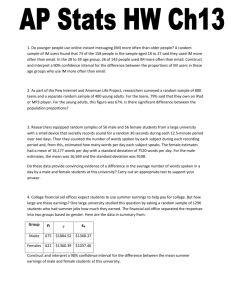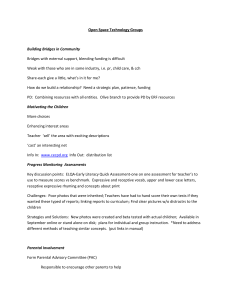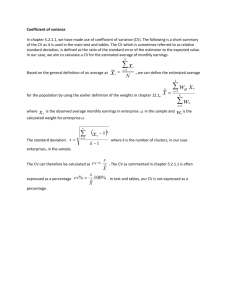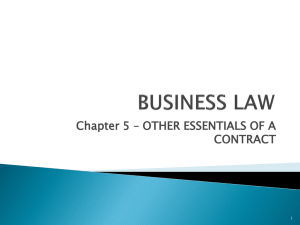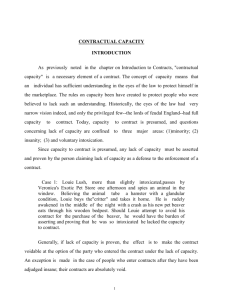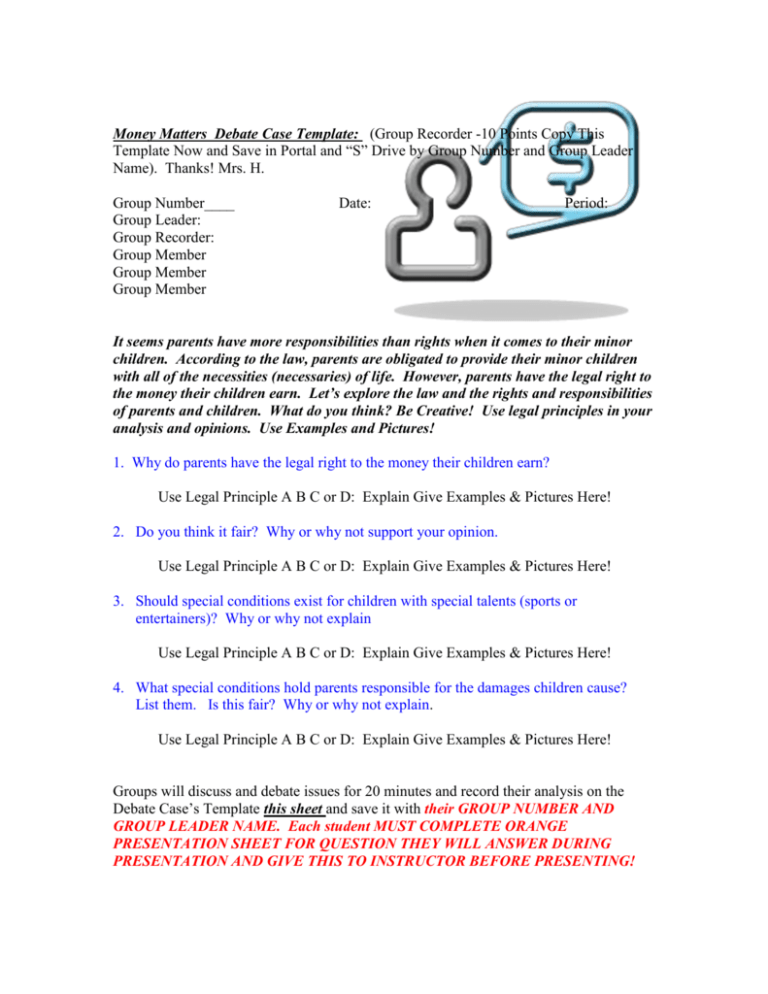
Money Matters Debate Case Template: (Group Recorder -10 Points Copy This
Template Now and Save in Portal and “S” Drive by Group Number and Group Leader
Name). Thanks! Mrs. H.
Group Number____
Group Leader:
Group Recorder:
Group Member
Group Member
Group Member
Date:
Period:
It seems parents have more responsibilities than rights when it comes to their minor
children. According to the law, parents are obligated to provide their minor children
with all of the necessities (necessaries) of life. However, parents have the legal right to
the money their children earn. Let’s explore the law and the rights and responsibilities
of parents and children. What do you think? Be Creative! Use legal principles in your
analysis and opinions. Use Examples and Pictures!
1. Why do parents have the legal right to the money their children earn?
Use Legal Principle A B C or D: Explain Give Examples & Pictures Here!
2. Do you think it fair? Why or why not support your opinion.
Use Legal Principle A B C or D: Explain Give Examples & Pictures Here!
3. Should special conditions exist for children with special talents (sports or
entertainers)? Why or why not explain
Use Legal Principle A B C or D: Explain Give Examples & Pictures Here!
4. What special conditions hold parents responsible for the damages children cause?
List them. Is this fair? Why or why not explain.
Use Legal Principle A B C or D: Explain Give Examples & Pictures Here!
Groups will discuss and debate issues for 20 minutes and record their analysis on the
Debate Case’s Template this sheet and save it with their GROUP NUMBER AND
GROUP LEADER NAME. Each student MUST COMPLETE ORANGE
PRESENTATION SHEET FOR QUESTION THEY WILL ANSWER DURING
PRESENTATION AND GIVE THIS TO INSTRUCTOR BEFORE PRESENTING!
Students are encouraged to access the CA Bar Association Site on
http://calbar.ca.gov/calbar/html_unclassified/4kids-19.htm Parents Rights and
Responsibilities provided in the Debates folder on the “S” drive available to each student.
Legal Principles from CA Constitution Regarding Rights and Responsibilities of
Parents and Children
A. Parents have a constitutional obligation to provide necessaries for children and
parents have a right to utilize children’s earnings to provide necessaries or chose
to save earnings for children’s future use.
B. Children have a right to specialized earnings, inheritances, gifts, and injury
awards that are set aside as children’s separate earnings.
C. Parents have the responsibility of supervision and control of the children’s
behavior. Parents may be fined in the event of destruction of property, injury to
others, stealing, truancy and curfew administrative fees and fines.
D. Children are expected to provide cooperation and obedience and not refuse to
obey the reasonable requests of his parents, run away from home, refuse to go to
school, or disregard outside parental control.
Groups will discuss and solve debate issues for 20 minutes and record their analysis with
the legal principle. The instructor will assist each group and observe and give
suggestions to facilitate the group’s evaluation of the cases correctly without giving the
solutions to the group. Students are encouraged to access the CA Bar Association Site on
http://calbar.ca.gov/calbar/html_unclassified/4kids-19.htm Parents Rights and
Responsibilities.
Each group recorder will present their evaluations and solutions to the debate issues and
answer questions from the other groups as to the legal principles involved
parents' rights and responsibilities
It seems as though parents have more responsibilities than anything else. Nevertheless,
parents do have some very important rights:
1. Custody and control: Parents must make important decisions about their children's
lives. For example, where the children will live, who they will live with, what they will
do from day to day, what school they will attend, when medical care might be
appropriate, and what, if any, religion their children will practice. These rights are
constitutionally protected and generally cannot be taken from parents unless it can be
shown that the parents are unfit.
2. Cooperation and obedience: Parents are expected to control their children, and are
permitted to discipline them, but must not abuse or neglect them. Sometimes a child
refuses to obey the reasonable requests of his parents, runs away from home, refuses to
go to school, or is outside parental control. In an extreme situation, parents may go to
court and seek to give up legal responsibility for the child. On the other hand, if parents
fail to adequately control a child, a court may determine that the child is in need of
supervision and declare him a ward of the court. When this occurs, the court
sometimes takes custody of the child and responsibility for the child's basic needs and
education. (See Kids in Need of Supervision.)
Children are not required to obey parental orders to do something dangerous or illegal.
Parents who allow or encourage children to commit dangerous or illegal acts may be
charged with contributing to the delinquency of a minor, p1 child abuse p2 or neglect.
p3
3. Earnings: Although most parents allow their child to keep money he or she has
earned, parents do have a legal right to these wages. p4 There are, however, some
exceptions to this rule. A child's earnings may not be available to parents when:
the parents have exploited, neglected, or abandoned the child and the child has
brought suit to be freed from parental dominion; p5
the child's income is the result of his special talent or athletic ability (the child
star or athlete); p6 or
the child's income is the result of a gift or inheritance. p7
4. Recovery for death or injury: If a child is killed or injured, parents are entitled to
bring a lawsuit to recover costs such as medical or funeral expenses from the person
responsible. p8
Parental Responsibilities
The most important responsibility of parents is to support their children. Parents are
legally obligated to provide their children with all of the necessities of life. p9 Necessities
are not limited to food, clothing, and shelter, but also include medical care. Parents are
expected to support their children according to their ability and their station in life, meaning
the children should share in the standard of living of both parents. p10 This responsibility
falls equally upon both parents and also applies to children that the parent has adopted. p11
Failure to provide adequate food, clothing, shelter, or parental care and supervision may
lead to criminal prosecution for neglect. p12 If the county is required to support a child, the
county is entitled to assignment rights to seek reimbursement from parents who are capable,
but have refused, to provide support. p13 Parents are also required to reimburse the county
for the costs of support incurred for detention of a child under a juvenile court order. p14
Parents must also pay back the county for the cost of legal services provided to minors in
juvenile court proceedings. p15 The duty to provide support to children lasts until the child
reaches the age of majority, which is usually 18, or 19, if she is still enrolled in high school
full-time. p16 (See Emancipation for exceptions.)
The failure of parents to marry does not affect the responsibility to support their
children. p17 If parents are unmarried, or divorce, and cannot agree upon how much each
should contribute toward the support of their children, the courts may be called upon to
decide. One parent, or the child by a guardian ad litem, may bring an action against the
parent to enforce the duty to pay child support. p18 Alternatively, the county may proceed
on behalf of a child to enforce the child's right of support against a parent who fails to
provide support. p19 A court may order one parent to make specified payments to the other
for child support. p20 The court's authority to order a parent to pay child support or to
enforce such an award includes the following: a writ of execution or levyp21, a wage
garnishment p22, civil contempt proceedings p23 or criminal prosecution. p24
Note: A stepchild (a child from a prior marriage) is generally not entitled to support
from a stepparent. p25 Birth parents remain primarily responsible for child
support unless the child has been adopted by the stepparent. p26 If, however, a
stepparent, or other person, provides necessary support to a child in good faith,
where the custodial parent neglects to do so, that person may recover the
reasonable value of those necessaries from the custodial parent. p27 However,
voluntary support paid out for a child is not required to be reimbursed by the
natural parents, stepchild or the state, absent a specific agreement. p28
Supervision and Control of Children
Parents are morally responsible for exercising proper supervision and control over
their children. However, generally, parents are not legally responsible for the acts of their
children. p29 There are certain exceptions. For example, parents who encourage their
children to break the law may be found guilty of contributing to the delinquency of a minor.
Also, parents who know or should know that their child engages in improper conduct or
who aid or encourage the conduct may be held liable for the acts of their children.
Additionally, there are specific statutes that hold parents liable for certain harm caused by
their children. These include:
Injuries from guns: Parents may be required to pay victims up to $60,000. p30
Willful misconduct: If the child causes injury or death to another, parents may
be liable for medical, dental and hospital expenses, up to $25,000. p31
Destruction of property: Parents are liable for sums children cannot pay, up to
$50,000. p32
Graffiti: Parents may be liable for the costs of removal, repair, and/or
replacement of property, as well as responsibility to keep the property free
from graffiti for up to one year. p33
Injuries from tear gas: Parents who have signed a minor's consent form to
obtain tear gas may be liable for the child's negligent or wrongful acts or
ommisions.p34
Fines for truancy: Parents may be required to pay fines up to $100. p35
back
Injuries on school grounds; Damage to school property; Failure to return
borrowed school property: Parents will be liable for up to $10,000, and up to
$10,000 for any reward. The school may withhold grades, diplomas or
transcripts until these amounts are paid. p36
Shoplifting: If a child steals from a store or library, the parents may be
responsible for up to $500. p37
Curfew violations: Parents must pay the actual administrative and
transportation costs incurred by the police for picking up and returning children
to their homes upon a second violation. p38
| home page | top | table of contents |
next
© 1996, 2000, 2001, 2002 The State Bar of California
All rights reserved. No part of this work may be reproduced, stored in a retrieval system, or
transmitted in any medium without prior written permission. Permission is hereby granted to
reproduce this work for educational use only.





